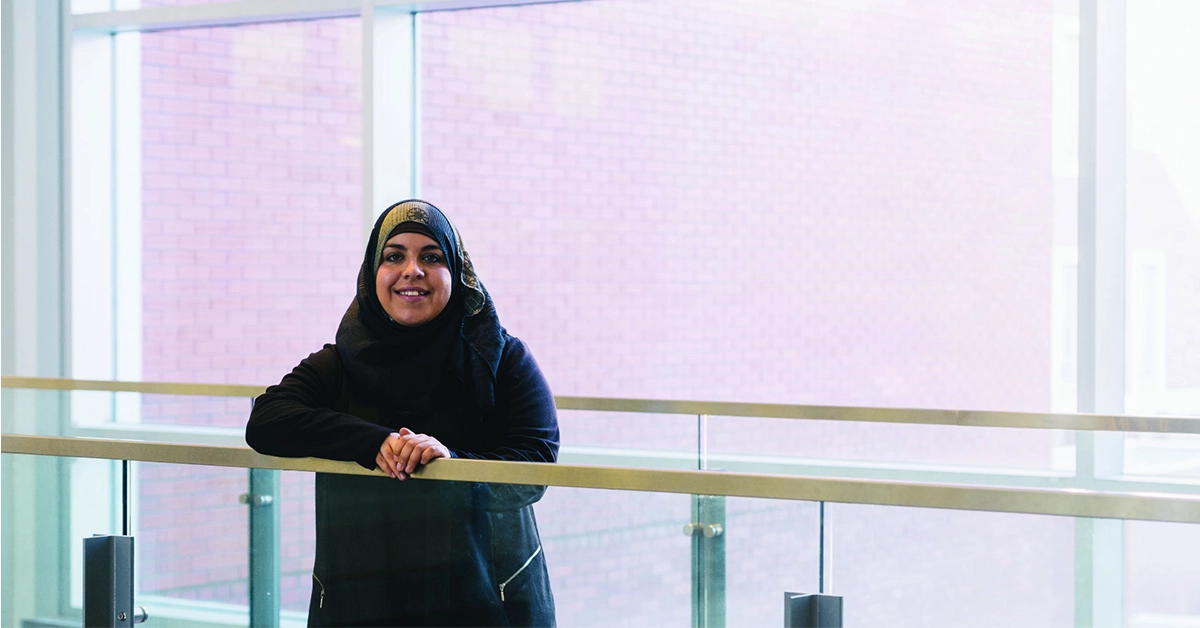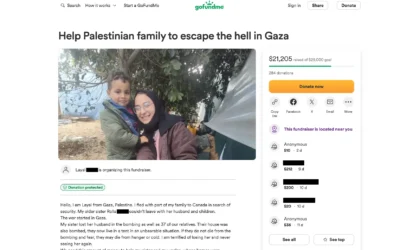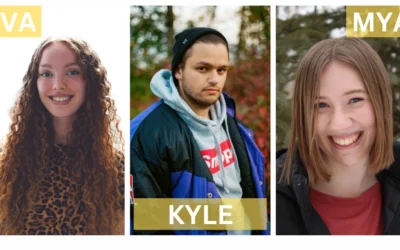Whether it’s a birthday party for a sibling or a conference for hundreds of students, the time and energy that goes into organizing events and initiatives can be nearly endless.
For activist and community organizer Nakita Valerio, however, it’s almost second nature.
Valerio has worked extensively within the social justice community in Edmonton, helping put together countless events, rallies, and groups centred around the promotion of equality.
Born and raised in Edmonton, her journey to becoming an activist — and a very visible one, at that — began not too long ago.
“I’ve always been social justice-minded,” she says. “I held my first peace march and protest against the war in Afghanistan in January of 2012, and that was kind of my launching pad and my first introduction to what demonstrating would be like.”
Additionally, Valerio cites her conversion to Islam as a catalyst for change in how she viewed the world and its injustices, and how she responded to them.
“One of the biggest things is that as I endeavoured to do different things in my life, particularly when I converted to Islam, it represented a sort of seismic shift in my understanding of the world and my knowledge base,” she says.
‘Stay humble. It’s really important to recognize that, throughout the entire process, no matter how prolific you get, you’re still learning and every day is a new challenge.’
-Nakita Valerio
Valerio adds that her religion acts as a foundation for her social justice work and a great motivation for being so heavily involved in her community.
“When I found my philosophical, ethical expression in Islam, it pushed me in terms of actually bringing what I believed at a social level into action,” Valerio says.
“I really learned a lot from the guidance of my religion, which I think is really important to bring to the floor, because it counters the narrative of what a lot of people think about Islam — it is very much a social justice-minded religion,” she adds.
Valerio’s conversion to Islam also meant that she started wearing a hijab, and this, too, impacted the way she saw the world and her work as an activist.
“When I started wearing the hijab, I started to understand what it meant to let go of some privilege and how society treated you differently, and that gave me insight into what people had been living as their own lived experience for a very long time,” Valerio says.
Being a hijabi (or a woman who wears a hijab) comes with its own set of unique obstacles. For Valerio, these problems are exacerbated acerbated by her visibility within the social justice community.
“Some of the challenges (include) being perceived as two-dimensional,” she says. “You sort of become this mouthpiece for all hijabis. People end up asking you a lot about your veil.”
Valerio is a master’s student at the University of Alberta in the department of history and classics, studying the Jewish departure from Morocco. This piece of information is something that often goes unheard by those who interact with Valerio, because of their interest in her hijab.
“I always found it interesting that people seem to be much more interested in how I get dressed in the morning than the actual research work that I do,” she says. “I get to talk about that a lot less than I get to talk about how I clothe myself.”
She adds that sometimes she is treated as the voice for all women in hijabs, something she feels is problematic and minimizes the diversity of voices among those who don a hijab.
This same problem is reflected in people’s perception of hijabis as authorities or spokespeople for their religion, something Valerio hopes can change.
“Sometimes, being perceived as an ambassador of the deen, or our religious way of life, can put people in unsafe situations, because we can start to feel like everything we do in the public eye is a reflection on Islam,” she says.
Valerio feels this perception can impact the way hijabis act in public, or the ways in which they do or do not defend themselves against criticism. For her, the solution lies in acknowledging the individuality of those who wear hijabs.
“Being aware that just because I wear a hijab on my head doesn’t mean I’m an ambassador for Islam 24/7, that this is just my religious expression, helps to break that down a little bit,” she says.
A further challenge for Valerio has been combatting the narrative that hijabs are markers of oppression.
“I have encountered some mainstream, or ‘second-wave feminists,’ you might call them, who view my hijab as a symbol of oppression, and continue to view it that way even when you make it known that it’s your choice,” she says.
However, Valerio has not found this response prohibitive to her work in the community, and she continues to be active and visible.
“There is some dismissiveness that does happen, but for the most part, the social justice community in Edmonton has been really warm and open,” she says. As the vice president of internal affairs for the Alberta Muslim Public Affairs Council (AMPAC), Valerio is kept busy with the work required to meet the demands of her position.
“The mandate of the organization is to combat Islamophobia and discrimination of all kinds, as well as promote civic engagement,” she says. “My portfolio deals specifically with community bridging.”
“We have women’s advocacy woven into everything that we do, including running women’s safety classes and creating safe spaces for women,” she says, adding that in addition to this, AMPAC looks to foster relationships with the Jewish and indigenous communities in Edmonton.
Most recently, Valerio’s work has been centred around combating and addressing anti-blackness in the Muslim community, as well as the broader community.
“I’m learning, too. I’ll be in the middle of something I organized and I’ll realize I’m participating as well, which is a funny thing to say, but this is a learning process for everybody,” she says.
Her work with AMPAC is supplemented by her academic life, as well as her responsibilities as a mother to a young child.
“My day starts quite early. There’s a lot of returning emails, a lot of returning messages, sometimes phone calls,” she says. “In the midst of all of this, I’m writing my thesis and booking rooms, and working with my team through AMPAC, and … dealing with people on a human level.”
While activism can feel urgent and demanding, Valerio says it’s important to acknowledge the human aspect of the work.
“It’s not just all business all the time. You have to keep your relationships alive and check in with people, and that’s my day-to-day process. There’s really a lot going on,” she says. In order to keep going and to make sure her work is sustainable, Valerio acknowledges the importance of self-care.
“Self-care for me looks like a lot of different things. It’s kind of learning to recognize what I need in particular moments, and going with that and being ok with that,” she says.
As a trauma survivor, Valerio also finds peace in her work.
“For me, working in social justice has promoted a lot of healing. Helping other people help themselves is a form of self-care for me,” she says.
For those hoping to dabble in social justice work or community organizing, Valerio offers a few words of wisdom.
“Don’t be afraid to listen. Meet as many diverse people as you can and take the time to listen to what they have to say,” she says.
“Stay humble. It’s really important to recognize that, throughout the entire process, no matter how prolific you get, you’re still learning and every day is a new challenge,” Valerio adds.
She adds that it is important to recognize that this specific branch of work can be particularly challenging.
“Community work is not easy. It’s dealing with human beings, and human beings are notoriously complex and difficult,” she says.
Having built up her experience with social justice-oriented work, Valerio was asked if she would do anything differently now that she knows the path such work has taken her down.
“If I had to go back and tell myself anything, it would be ‘start sooner.’”
Cover photo by Matthew Jacula.





0 Comments